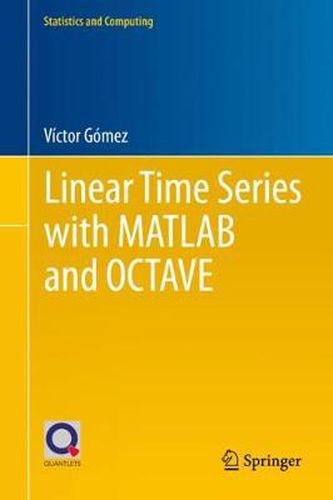Readings Newsletter
Become a Readings Member to make your shopping experience even easier.
Sign in or sign up for free!
You’re not far away from qualifying for FREE standard shipping within Australia
You’ve qualified for FREE standard shipping within Australia
The cart is loading…






This title is printed to order. This book may have been self-published. If so, we cannot guarantee the quality of the content. In the main most books will have gone through the editing process however some may not. We therefore suggest that you be aware of this before ordering this book. If in doubt check either the author or publisher’s details as we are unable to accept any returns unless they are faulty. Please contact us if you have any questions.
This book presents an introduction to linear univariate and multivariate time series analysis, providing brief theoretical insights into each topic, and from the beginning illustrating the theory with software examples. As such, it quickly introduces readers to the peculiarities of each subject from both theoretical and the practical points of view. It also includes numerous examples and real-world applications that demonstrate how to handle different types of time series data. The associated software package, SSMMATLAB, is written in MATLAB and also runs on the free OCTAVE platform.
The book focuses on linear time series models using a state space approach, with the Kalman filter and smoother as the main tools for model estimation, prediction and signal extraction. A chapter on state space models describes these tools and provides examples of their use with general state space models. Other topics discussed in the book include ARIMA; and transfer function and structural models; as well as signal extraction using the canonical decomposition in the univariate case, and VAR, VARMA, cointegrated VARMA, VARX, VARMAX, and multivariate structural models in the multivariate case. It also addresses spectral analysis, the use of fixed filters in a model-based approach, and automatic model identification procedures for ARIMA and transfer function models in the presence of outliers, interventions, complex seasonal patterns and other effects like Easter, trading day, etc.
This book is intended for both students and researchers in various fields dealing with time series. The software provides numerous automatic procedures to handle common practical situations, but at the same time, readers with programming skills can write their own programs to deal with specific problems. Although the theoretical introduction to each topic is kept to a minimum, readers can consult the companion book ‘Multivariate Time Series With Linear State Space Structure’, by the same author, if they require more details.
$9.00 standard shipping within Australia
FREE standard shipping within Australia for orders over $100.00
Express & International shipping calculated at checkout
This title is printed to order. This book may have been self-published. If so, we cannot guarantee the quality of the content. In the main most books will have gone through the editing process however some may not. We therefore suggest that you be aware of this before ordering this book. If in doubt check either the author or publisher’s details as we are unable to accept any returns unless they are faulty. Please contact us if you have any questions.
This book presents an introduction to linear univariate and multivariate time series analysis, providing brief theoretical insights into each topic, and from the beginning illustrating the theory with software examples. As such, it quickly introduces readers to the peculiarities of each subject from both theoretical and the practical points of view. It also includes numerous examples and real-world applications that demonstrate how to handle different types of time series data. The associated software package, SSMMATLAB, is written in MATLAB and also runs on the free OCTAVE platform.
The book focuses on linear time series models using a state space approach, with the Kalman filter and smoother as the main tools for model estimation, prediction and signal extraction. A chapter on state space models describes these tools and provides examples of their use with general state space models. Other topics discussed in the book include ARIMA; and transfer function and structural models; as well as signal extraction using the canonical decomposition in the univariate case, and VAR, VARMA, cointegrated VARMA, VARX, VARMAX, and multivariate structural models in the multivariate case. It also addresses spectral analysis, the use of fixed filters in a model-based approach, and automatic model identification procedures for ARIMA and transfer function models in the presence of outliers, interventions, complex seasonal patterns and other effects like Easter, trading day, etc.
This book is intended for both students and researchers in various fields dealing with time series. The software provides numerous automatic procedures to handle common practical situations, but at the same time, readers with programming skills can write their own programs to deal with specific problems. Although the theoretical introduction to each topic is kept to a minimum, readers can consult the companion book ‘Multivariate Time Series With Linear State Space Structure’, by the same author, if they require more details.